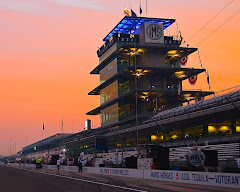 This can not bode well for temporary racing circuits in the IndyCar Series. According to the CBC, the 2009 Rexall Edmonton Indy lost $3.9 million. The good news is that this is an improvement compared with 2008, when the Edmonton IndyCar event lost $5.2 million.
This can not bode well for temporary racing circuits in the IndyCar Series. According to the CBC, the 2009 Rexall Edmonton Indy lost $3.9 million. The good news is that this is an improvement compared with 2008, when the Edmonton IndyCar event lost $5.2 million.
For those who are keeping score, that's $9.1 million in government funds that have been flushed down the toilet in just two years. If IndyCar were to attract a substantial television audience, then the money might be justified as an investment.
Unfortunately, that is not the case. The Edmonton Indy earned a 0.4 cable rating on ESPN in 2008 and a .24 cable rating on Versus in 2009.
U.S. television viewers have spoken. There is very little demand for this event.
The math is not difficult. The municipal and provincial governments have backstopped $9.1 million in exchange for a grand total of approximately 700,000 U.S. television viewers over two years. That's $13 per viewer.
If Edmonton were a profit-seeking enterprise, then it would have no choice but to follow Richmond out the door. When the contract expires following the 2010 Edmonton Indy, I suspect that we should anticipate the same conclusion.
Roggespierre


This appears to be the poster child for permanent facilities. Ovals or Road courses take your pick but it is clear that street circuits just don't have enough appeal to make them profitable. Long Beach is an exception but not the rule. So, can we put Road America or Michigan back on the radar?
ReplyDelete90% of street festivals like Edmonton are LOSERS. Always have been and always will be.
ReplyDeleteThey are exactly what is WRONG about the current state of Indy Car Racing.
Go to Las Vegas, Richmond, Nashville, Charlotte, Milwaukee, Loudon, Phoenix, Road America, Road Atlanta and Miller Motorsports Park and leave these "non races" at "non race tracks" in the ugly past. Make it work. Put a racing product out there that some people will be interested in and grow your series.
I think you guys are missing the point Roggespierre is making. It is not that "these events" don't make money. INDY RACING events don't make money. Whether they are at the Milwaukee Mile, some airport in Edmonton or Phoenix, Gateway, Dover, Atlanta, Nashville, New Hampshire, Auto Club Speedway, Michigan Speedway, Pikes Peak, or Richmond. Indy races cost too much in comparison to the amount of tickets a promoter can sell.
ReplyDeleteSo, they need to figure out a way to SELL MORE TICKETS.... or they need to figure out how to COST LESS.
Donald: With all due respect sir......Isn't the purpose of promoting a race to make money? Both the race and the series don't seem to be profitable. Why would anyone want to continue down a road they can't profit from? I think it is time for the powers that be review their business model.
ReplyDeleteYou guys have all presented arguments that, in my view, are correct.
ReplyDeleteMy beef is with the Culture of Entitlement that is shared by IRL management and IndyCar teams.
To them, I say no. No, you are not entitled to race the cars that you want to race. You are not entitled to race at the circuits where you would like to race. You can not afford to race that way. You must earn the right by first attracting an audience.
IRL management and IndyCar teams absolutely HATE hearing that. The notion is one that they reject. They do not intend to serve anyone, least of all a U.S. market that does not like what many IndyCar participants happen to like.
That is why they must bilk governments out of millions. That is why they must arbitrage supply chains. That is why they take money from drivers who will never be embraced by a significant number of U.S. racing fans. That is why they require subsidies from the Indianapolis Motor Speedway.
The Culture of Entitlement is likely the single biggest obstacle to developing an IndyCar Series that the mass U.S. market might accept.
One of my goals here is to demonstrate the truth of IndyCar's market failure. These guys like races such as Edmonton because 60K looks good enough at an airport to make the participants feel as if they are cool. That it required a $4 million government backstop does not matter to them.
60K would half-fill Chicagoland. This tends to make the participants fell less cool. The track also happens to be one that road racers typically do not like. Because Chicagoland must turn a profit, it will likely abandon the IRL after this season. Participants will be more than happy to replace it with, say, Baltimore, without regards to the financial sinkhole that the City and State will undoubtedly be required to back fill.
The Culture of Entitlement causes me to seethe.
Best Regards,
Roggespierre
Oldwrench first said "This appears to be the poster child for permanent facilities. Ovals or Road courses take your pick but it is clear that street circuits just don't have enough appeal to make them profitable. Long Beach is an exception but not the rule. So, can we put Road America or Michigan back on the radar?"
ReplyDelete... then said... "Isn't the purpose of promoting a race to make money? Both the race and the series don't seem to be profitable. Why would anyone want to continue down a road they can't profit from? I think it is time for the powers that be review their business model."
Your first comment does not jive with the second. Of course the purpose of promoting a race is to make money. However, contrary to your first comment, Almost NO Indy races make money. So it isn't about permanent facilities or temporary facilities. It isn't about ovals vs. roads. vs. streets. Indy racing is not financially viable at almost ANY venue. This is the problem that needs fixing. Going to Michigan or Road America won't fix that.
Permanent facilitys are owned by someone or some company. They won't stay open if they can not produce revenue of a positive nature. If an Indy Car race makes no money and the only way for it to exsist is to subsidized it then I certainly can't see ANY reason to continue. My point was that most permanent courses are noramal already owned and payed for. I know that the sanctioning fees and the extras that go with any racing today make it very difficult to be profitable.I do support RP's point on entitlement. Everybody seems to think they are owed something.
ReplyDeleteGuys:
ReplyDeleteThe above discussion reminds of a plaque on the wall of my father's banker's office. It read: "The world owes you a living, BUT you must earn it." The IRL management seems to believe in the first part, but TOTALLY ignores the second part.
This is like the local opera company or symphony. Deep pockets are making it work. Many PGA events are money losers on the surface, too. Milwaukee's event had a $4 mil purse, and played on a public course. An IRL race there only costs a $1 mil sanction fee...on a public oval. Public sports subsidies are nothing new. The Brewers and Packers both play in subsidized stadiums. The invariable argument for all this is the value of tax revenues from "visitors" and employment in the hospitality sector. Additionally, I know some states tax the income of visiting athletes, which is substantial when one earns what many do. A $5 million ballplayer playing 6 games in such a state owes taxes on $222k. An NFL footballer $312k for playing one game - that's like one substantial "small business" per player.
ReplyDelete